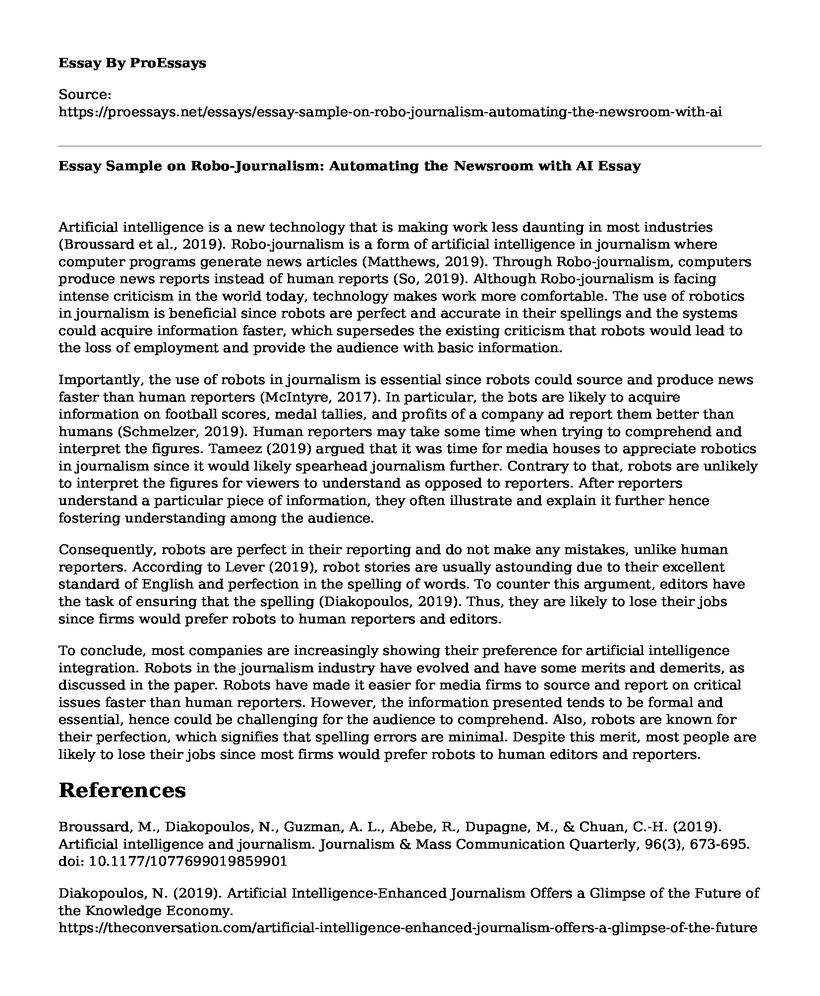Artificial intelligence is a new technology that is making work less daunting in most industries (Broussard et al., 2019). Robo-journalism is a form of artificial intelligence in journalism where computer programs generate news articles (Matthews, 2019). Through Robo-journalism, computers produce news reports instead of human reports (So, 2019). Although Robo-journalism is facing intense criticism in the world today, technology makes work more comfortable. The use of robotics in journalism is beneficial since robots are perfect and accurate in their spellings and the systems could acquire information faster, which supersedes the existing criticism that robots would lead to the loss of employment and provide the audience with basic information.
Importantly, the use of robots in journalism is essential since robots could source and produce news faster than human reporters (McIntyre, 2017). In particular, the bots are likely to acquire information on football scores, medal tallies, and profits of a company ad report them better than humans (Schmelzer, 2019). Human reporters may take some time when trying to comprehend and interpret the figures. Tameez (2019) argued that it was time for media houses to appreciate robotics in journalism since it would likely spearhead journalism further. Contrary to that, robots are unlikely to interpret the figures for viewers to understand as opposed to reporters. After reporters understand a particular piece of information, they often illustrate and explain it further hence fostering understanding among the audience.
Consequently, robots are perfect in their reporting and do not make any mistakes, unlike human reporters. According to Lever (2019), robot stories are usually astounding due to their excellent standard of English and perfection in the spelling of words. To counter this argument, editors have the task of ensuring that the spelling (Diakopoulos, 2019). Thus, they are likely to lose their jobs since firms would prefer robots to human reporters and editors.
To conclude, most companies are increasingly showing their preference for artificial intelligence integration. Robots in the journalism industry have evolved and have some merits and demerits, as discussed in the paper. Robots have made it easier for media firms to source and report on critical issues faster than human reporters. However, the information presented tends to be formal and essential, hence could be challenging for the audience to comprehend. Also, robots are known for their perfection, which signifies that spelling errors are minimal. Despite this merit, most people are likely to lose their jobs since most firms would prefer robots to human editors and reporters.
References
Broussard, M., Diakopoulos, N., Guzman, A. L., Abebe, R., Dupagne, M., & Chuan, C.-H. (2019). Artificial intelligence and journalism. Journalism & Mass Communication Quarterly, 96(3), 673-695. doi: 10.1177/1077699019859901
Diakopoulos, N. (2019). Artificial Intelligence-Enhanced Journalism Offers a Glimpse of the Future of the Knowledge Economy. https://theconversation.com/artificial-intelligence-enhanced-journalism-offers-a-glimpse-of-the-future-of-the-knowledge-economy-117728
Lever, R. (2019). Robo-Journalism Gains Traction in Shifting Media Landscape. https://phys.org/news/2019-03-robo-journalism-gains-traction-shifting-media.html
Matthews, K. (2019). The Good and Evil of Robo-Journalism. https://betanews.com/2019/03/18/the-good-and-evil-of-robo-journalism/
McIntyre, C. (2017). Robo-Journalism: Computer-Generated Stories May Be Inevitable, But it's Not All Bad News. https://theconversation.com/robo-journalism-computer-generated-stories-may-be-inevitable-but-its-not-all-bad-news-89473
Schmelzer, R. (2019). AI Making Waves in News and Journalism. https://www.forbes.com/sites/cognitiveworld/2019/08/23/ai-making-waves-in-news-and-journalism/#6aedb0307748
So, D. (2019). Robo Journalism: Should Journalists Feel Threatened By Them? https://towardsdatascience.com/robo-journalism-should-journalists-feel-threatened-by-them-95185d68eb8d
Tameez, H. (2019). Artificial Intelligence Won't Kill Journalism Or Save It, But the Sooner Newsrooms Buy In, the Better. https://www.niemanlab.org/2019/11/artificial-intelligence-wont-kill-journalism-or-save-it-but-the-sooner-newsrooms-buy-in-the-better/
Cite this page
Essay Sample on Robo-Journalism: Automating the Newsroom with AI. (2023, Apr 08). Retrieved from https://proessays.net/essays/essay-sample-on-robo-journalism-automating-the-newsroom-with-ai
If you are the original author of this essay and no longer wish to have it published on the ProEssays website, please click below to request its removal:
- Criminal Law Story by the Canadian Press
- Sustainability: Renewable Energy Essay Example
- Essay Sample on Texas Media Organizations
- Essay Sample on Technology Design and Artificial Intelligence
- Neural Network Application in Insurance Industry Essay Example
- Essay Example on Humans' Enduring Pursuit of Problem-Solving Through Innovation and Creativity
- Essay Example on the Potential of Blockchain AI and Alexa: Disrupting the Future







